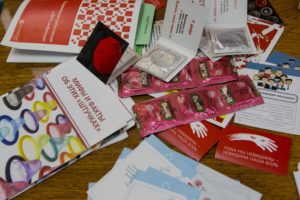
Author: Anastasia Petrova, Russia
Sex-workers are one of the groups that are vulnerable to HIV. There are no government programs aimed at working with this category in Russia. According to Russian Federal Consumer Rights Protection and Human Health Control Service, over the past two years the way of sexual transmission of HIV has become more prominent: in 50.3% of instances, the positive status was received during heterosexual contacts. According to a study conducted by the Open Health Institute in 2017, the percentage of sex workers with HIV varies from 1.3% to 8.9%, depending on the region. In cases when sex work is combined with drug use, up to 15% of people become HIV-positive.
Epidemic of Violence
Sex-workers are vulnerable to HIV for a number of reasons. They have limited access to medical, legal and social services, information and prevention means. However, the most significant factor is violence from partners, clients, administrators, and police officers.
In 2015, the Sex-Workers’ Rights Advocacy Network in Central and Eastern Europe and Central Asia (SWAN) conducted a study ‘Failures of Justice’. The community on its own studied violence against sex workers. The study showed that 28% of girls in Russia were physically abused, and 4.8% – sexually abused by the police.
According to the study, the above statistics directly correlate with the HIV incidence rate among sex workers. Persecution by the police deprives sex workers of the opportunity to work in safe conditions, choose clients, or use condoms at every contact.
Unique HIV prevention project

The Silver Rose, a movement of sex workers and their supporters, has been fighting against violence since 2003. Today, the movement unites 450 sex worker leaders in more than 35 regions of the Russian Federation. Under the guidance of the leader Irina Maslova, the Silver Rose, using their own resources, are implementing a unique for Russia HIV prevention project aimed at this key group. The girls are provided with condoms, referrals to trusted doctors, and psychological and legal assistance; they are taught how to protect themselves from HIV and violence.
For instance, during March – December 2017, the Silver Rose implemented on its own the project ‘Bridging the Gaps’ in the framework of the Program on Expanding Access of Vulnerable Groups to HIV/AIDS Prevention, Treatment and Support Services in the Russian Federation. 1509 people were tested for HIV in the course of the 9 months’ work.
Involving community representatives in the project work is the basis for effective prevention. In addition to highlighting services of prevention of HIV and sexually transmitted infections (STIs), a lot of emphasis is placed on strengthening the community and increasing the legal literacy of sex workers. Girls must learn to defend themselves in the face of a constant threat of violence.
“Now this is not a project any more, but a program instead,” says Irina Maslova, referring to the continuity with which the movement helps sex workers. “These processes continue, even if funding ends. Now, at the completion of projects supported with grants of the Global Fund to Fight AIDS, we are thinking about the transition to self-financing.”
Current Legislation Does Not Solve Problems
As of today, the legislation of the Russian Federation triggers and promotes discrimination of sex workers as well as human rights violations. Sex work is punished under administrative and criminal codes. The Code on Administrative Offenses prohibits “Prostitution” (Article 6.11) and “Receiving income from prostitution if this income is associated with another person’s prostitution activity” (Article 6.12).
However, this discriminatory legislation poses more problems than it solves since it deprives sex workers of fundamental rights and freedoms, including freedom of assembly on issues of healthcare and HIV prevention. Sex workers remain vulnerable to humiliation and violence from clients, as well as to abuse from the police.
For this very reason, introducing amendments to the legislation and repeal of Article 6.11 have long been the main goal of the work of the Silver Rose movement in general and Irina Maslova in particular. After all, the repeal of the mentioned article, according to experts, will promote the observance of the rights of sex workers since they will not be afraid to turn to the police for help in cases of maltreatment or violence from clients. Decriminalization will also help sex workers self-organise to protect their rights, health and life.



